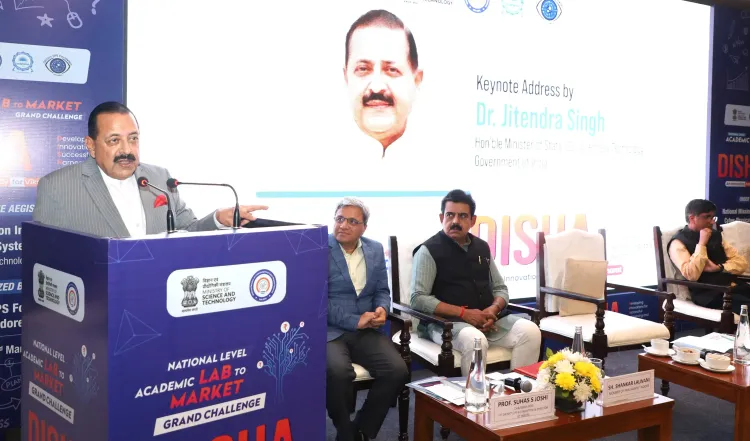India's R&D Investment Has Doubled Over the Last Decade: Union Minister

Synopsis
Key Takeaways
- R&D spending has significantly increased over the past ten years.
- Government initiatives are crucial for scientific advancements.
- Focus on homegrown innovations in AI, biotechnology, and quantum computing.
- Private sector participation is now encouraged in strategic fields.
- AI is enhancing healthcare accessibility and quality.
New Delhi, March 3 (NationPress) India's investment in Research and Development (R&D) has increased twofold over the past decade, rising from Rs 60,196 crore in 2013-14 to Rs 1,27,381 crore, as stated by Union Minister of State (Independent Charge) for Science and Technology Jitendra Singh on Monday. He emphasized the pivotal role of government-supported initiatives in driving scientific progress in the nation.
The Union Minister pointed out that the increase in R&D spending is crucial for shaping India's future economy, which will be characterized by indigenous innovations in artificial intelligence, biotechnology, and quantum computing.
During his address at the DISHA event held at the India Habitat Centre in the national capital, Singh elaborated on the government's comprehensive strategy to elevate India as a global frontrunner in deep-tech innovation and commercialization.
He reiterated that India is making remarkable progress in nurturing an intellectual property (IP)-focused innovation ecosystem, with the collaboration of academia, industry, and startups playing a crucial role.
"The government’s focus on research and development funding has resulted in India’s Gross Expenditure on Research and Development (GERD) more than doubling in the last decade, from Rs 60,196 crore in 2013-14 to Rs 1,27,381 crore," Singh remarked.
“The government is not only channeling resources into research but also ensuring that these innovations transition smoothly from laboratories to industries, thereby reinforcing the foundation of Atmanirbhar Bharat,” he added.
Singh attributed the success of these initiatives to India’s policy reform allowing private sector involvement in strategic domains such as space technology and nuclear research.
“What was previously restricted to government entities is now accessible to private firms, facilitating quicker technological advancements, improved efficiency, and enhanced global competitiveness,” Singh declared.
Additionally, Singh highlighted the effectiveness of AI-driven mobile telemedicine units in enhancing healthcare access to remote regions.
“AI-based diagnostics and telemedicine services are already transforming patient care, making premium healthcare accessible and affordable for everyone,” he noted.
However, he emphasized the necessity of balancing AI with human expertise. “AI's purpose is to support human intelligence, not to replace it. A hybrid strategy will ensure that technology enhances the roles of skilled professionals in healthcare and other vital sectors,” Singh concluded.









